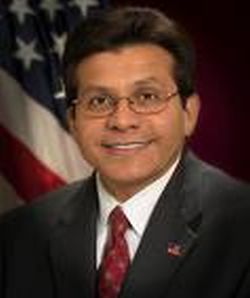Alberto Gonzales is down to his last two weeks as Attorney General. And the moral rot he has introduced into the internal system of the justice department, something truly unprecedented in America’s history, is now being manifested in clear physical signs. Two stories out this morning tell the case vividly.
The Mutiny
Emma Schwartz at U.S. News & World Report tells us that a large part of the attorney staff at the Department of Justice are refusing to appear on behalf of the Department and make arguments or write briefs connected with Guantánamo.
The government’s legal arguments justifying the detention of hundreds of people at the Guantánamo Bay naval base have been repudiated three times by the U.S. Supreme Court. But it’s not just outsiders who take issue with the U.S. Justice Department strategy: Up to one fourth of the department’s own civil appellate staff has recently opted out of handling the government’s cases against detainee appeals, two sources familiar with the matter tell U.S. News.
These conscientious objectors—their exact number is not known—have decided not to take part in the government’s litigation against the detainees because of disagreements with the legal approach, these sources say. They would not elaborate on the specific reasons for the objections, but critics have long objected to the government’s failure to formally charge detainees and have pushed for closing Guantánamo because of allegations of torture and inhumane conditions. Defense lawyers also contend that the government has stymied their cases by withholding documents and curbing client access.
The quiet rebellion has emerged in recent months among the approximately 56 attorneys in the appellate section of the Justice Department’s civil division following a court ruling in February that placed the defense of the approximately 130 remaining Guantánamo cases under the responsibility of the appellate lawyers. More than 300 men captured shortly after the U.S. invasion of Afghanistan in 2001 are still being held at Guantánamo over alleged ties to terrorists, although all but a handful have never been formally charged with crimes.
Where there’s smoke, there’s usually fire. Under the Code of Professional Responsibility, there are certain circumstances when a lawyer is not ethically permitted to appear and advance arguments that a client wants him to make. One is when the client is appearing in court advancing claims of fact that the lawyer knows to be untrue. Another is when the client wants to make arguments as to law which are not well grounded in the law, or in a good-faith argument for its reversal, modification or reinterpretation. In connection with Guantánamo, the Justice Department already has a very long track record of prevarication in submissions to courts. So much so that the Fourth Circuit, the most conservative Court of Appeals in the country, recently raked it over the goals for making misleading statements. And indeed, Judge Michael Luttig, often considered high on the short list for a Supreme Court appointment under the Bush Administration for his tightly held and extremely conservative judicial values, went out of his way to indicate that he felt Justice Department lawyers had been misleading the court over detainee treatment issues. Similarly, on the law, the Justice Department has lost three straight cases before an extremely conservative Supreme Court on detainee treatment issues, and is preparing to lose a fourth.


Not that these loses make any difference, of course. Sailing under Captain Gonzales, the USS Justice just presses forth, ignoring the guidance from the High Court, and the pleas of the mates on board, who see the shoals ahead.
All this prompts the question: what sort of whoppers is the Justice Department preparing to serve up to the courts now that has provoked such a full scale mutiny? It also raises some very serious questions about the stewardship of Paul Clement, the Solicitor General, whose own reputation is good, but blemished, if anywhere, precisely on this issue. Clement is set to succeed Gonzales as interim Attorney General when Gonzales departs in two weeks.
Fiscal Mismanagement
Scott Paltrow at the Wall Street Journal points to a crippling budget crisis which has struck the Justice Department. This is a familiar theme. The Bush Administration decided after 9/11 to dramatically reallocate resources from regular law enforcement activities (battling fraud and violent crimes) to counterterrorism. Its counterterrorism programs have been spectacularly ineffective—with nary a successful prosecution to speak of and an environment which is, by all counts, continually deteriorating. This is connected, I believe, with the “Brownie Principle.” Instead of putting serious professionals in charge, Gonzales’s Justice Department prefers to turn to political hacks who support the use of counterterrorism as a fear manipulator to help Karl Rove and the White House achieve partisan political objectives. But the flip side, the mismanagement of core law-enforcement functions, is even more alarming.
Whoever succeeds Alberto Gonzales as attorney general will face a long list of challenges at the Justice Department, from unfilled senior positions to sagging morale. One of the most pressing, according to dozens of current and former federal prosecutors, is a budget squeeze at U.S. attorneys’ offices that has led to declines in crime prosecutions and delays in major investigations.
In the past few years, U.S. attorneys’ offices around the country have been unable to fill vacancies. Lawyers sometimes can’t travel to interview witnesses. Even funds for basic office needs such as photocopying documents and obtaining deposition transcripts have been cut, according to current and former officials.
Overall, funding for the offices has grown well below the rate of inflation. As a result, “fewer cases were getting charged and bigger investigations were taking longer because there weren’t enough prosecutors to do them,” says Debra Yang, who stepped down in October 2006 as the U.S. attorney in Los Angeles.
Department of Justice data show the impact. Prosecutions are down overall, with large drops in categories such as drugs, violent crime and white-collar offenses…
Justice Department statistics show that the total number of criminal cases filed by U.S. attorneys’ offices peaked in fiscal 2004 and dropped by 4.5% between then and 2006, the latest available data. The falloff was more dramatic, and began earlier, in certain categories. Drug prosecutions dropped 11% between 2002 and 2006. After a jump between 2002 and 2003, violent-crime cases fell 8.5% between 2003 and 2006. White-collar crime prosecutions increased somewhat in 2006 after declining steadily for several years, but still remained 8% below the peak in 2002 of 6,252.
Note that the budget shortfall comes entirely as a result of managerial process. The Justice Department has not sought more money. In fact just the opposite. Back on June 29, I sat through a Judiciary Committee hearing in which a Justice Department representative was being asked why the Justice Department was not seeking more funds to handle fraud investigations and the like. He sat in rather embarrassed silence, obviously understanding the absurdity of the Gonzales Justice Department’s position, but lacking authority to do anything else.
But beyond this, the cash shortfalls seem to be wielded in suspiciously convenient ways: to impede the investigation of corruption allegations targeting high-profile Republicans. Paltrow uncovers the answer to a long-pending riddle, namely, whatever happened to the corruption investigation targeting California Republican Jerry Lewis? There is good reason to suspect that Karl Rove was distressed by this investigation, and the decision to nudge out two U.S. Attorneys–in San Diego and Los Angeles–was driven by a desire to impede his case.
In 2006, Los Angeles federal prosecutors were in the middle of a wide-ranging investigation of Rep. Lewis of California, who until January was chairman of the powerful House Appropriations Committee. He remains its senior Republican. The investigation focused on earmarks, or special spending measures, that benefited clients of a now-defunct lobbying firm to which he had close ties.
People with knowledge of the case said that by the time the investigation stalled in December 2006, it had branched out into other areas, including Mr. Lewis’s June 2003 role in passing legislation that helped giant hedge fund Cerberus Capital Management. People associated with Cerberus around the same time gave at least $140,000 to a political action committee controlled by Mr. Lewis. Cerberus officials didn’t respond to phone calls or emailed questions concerning the Lewis inquiry.
Money from the PAC was distributed to Republican congressional candidates facing difficult campaigns. The largesse was credited with gaining Mr. Lewis enough support from Republican House members to be chosen as appropriations committee chairman in January 2005. In addition, federal agents were looking into whether Mr. Lewis may have improperly paid for personal expenses with PAC funds. Barbara Comstock, a spokeswoman for Mr. Lewis, said, “We have no comment,” in response to emailed questions about the investigation.
After the lead prosecutor in the Lewis case quit, others assigned to the case took time getting up to speed. Brian Hershman, a former deputy chief of the Los Angeles office’s public corruption section, declined to comment on specific cases, but confirms that his group’s work overall was derailed by the departure of experienced prosecutors. Like several others, he says he left for more money to support his family. Replacements “are mostly rookies,” he says. “It will be some time before they’ll be able to restore the section to what it was before.”
We are witnessing once more the consequences of intense politicization of the administration of justice. It means: no ethics, no integrity, little law–and the result is that we are much less safe and have institutions of justice, once our point of pride, which now draw derisory comment around the world.
Is there any wonder why there is a mutiny at Justice? The “mutineers” are the lawyers who insist on what this institution used to stand for: solid ethical values and a firm adherence to the law. Three cheers for them! It’s well past time for Gonzales and his crew to be set adrift in a lifeboat at high sea. They were never legitimate guardians of this institution. They were and are pirates who have hijacked it. And the court of accountability is still waiting for their appearance.



